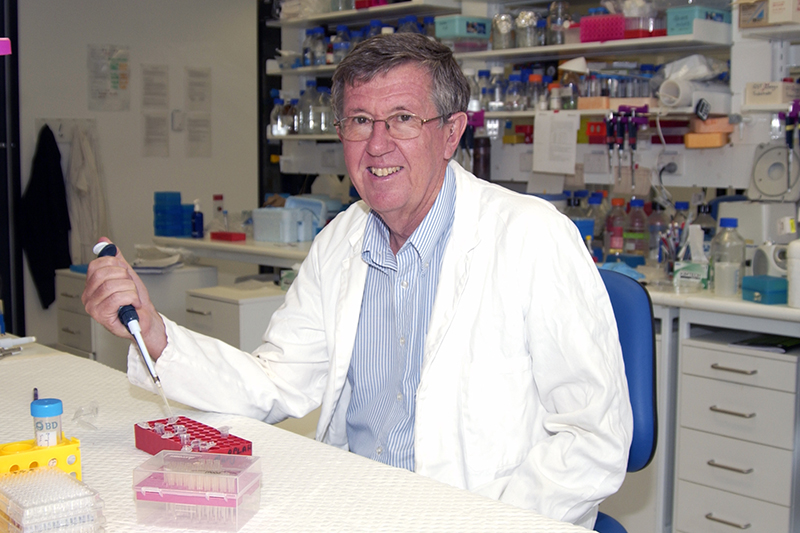2023 UNE Distinguished Alumni Award winner - Professor Philip Board
In recognition of his outstanding contributions to medical research, particularly in the areas of biochemistry and molecular biology
During the slow march of science, many small yet significant contributions can go unheralded, lost amid the ‘Eureka!’ moments. It takes decades for discoveries to accumulate and translate into novel diagnostic tools or wonder drugs capable of saving lives. Even then, modest trailblazers like Professor Philip Board rarely command the spotlight.
Which makes his 2023 UNE Distinguished Alumni award a fitting tribute – to a lifetime of long days in the laboratory with his students seeking answers to complex questions about how humans metabolise foreign chemicals like cancer-causing carcinogens and pharmaceutical drugs.
He may not be a household name, but Professor Board has revolutionised our understanding of the pivotal role that some enzymes (biological catalysts that speed up cellular chemical reactions) play in triggering inflammation. Work that, one day, he hopes will herald new treatments for cancer, as well as a range of common conditions associated with chronic inflammation – like gout, multiple sclerosis, Parkinson’s and Type 2 diabetes.
Now an Emeritus Professor at ANU’s John Curtin School of Medical Research, where he has largely worked since 1977, Philip has devoted much of his scientific career to investigating a class of enzymes known as Glutathione Transferases (or GSTs).
“It turns out there are at least 17 GSTs in humans and many of them detoxify drugs and cancer-causing chemicals called xenobiotics that we get from the environment,” said Professor Board, who until his ‘retirement’ in 2014 was Professor of Human Genetics and later Head of the Division of Molecular Medicine at John Curtin. “It took a while to identify them all and work out what they do, but in 1996 I discovered one – GST-O1 – that plays a peculiar role in regulating inflammation.
“GST-O1 is expressed all over the body and regulates the production of a chemical messenger that causes inflammation and damaging pathology in many non-infectious diseases. So, we are trying to develop drugs that inhibit its activity and prevent the pathology associated with inflammation. It could benefit a great many people and be worth a lot of money.”
Professor Board is recognised as an international authority on GSTs. In collaboration with partners at Monash University, he has co-founded the start-up Omega-One Therapeutics and secured NHMRC funding and a CUREator grant to discover GST-O1 inhibitors. The ultimate aim is to develop a new range of anti-inflammatory therapies.
And, to think, it all dates back to UNE, from where Philip graduated with First Class Honours in Physiology in 1973 and then a PhD in 1977. “A lot of the work I am doing today on glutathione started during Honours, continued throughout my PhD and I’m still working on it,” said Professor Board, who credits Professor Nihal Agar, Professor Jack Evans and Dr Ron Morris in the UNE Department of Physiology with providing a stimulating and encouraging environment in which to develop his research skills.
He has since invented several novel methods for studying and mapping the genetic variations in GSTs, spawning a suite of further studies.
“Philip’s been a trail blazer in his area and at the forefront of many of the major advances in this field,” said Honorary Associate Professor at ANU, Dr Marco Casarotto. “His contributions have been recognised with various awards, including a Career Achievement Award from the International Society for the Study of Xenobiotics, and the prestigious Lemberg Medal from the Australian Society for Biochemistry and Molecular Biology. His earlier work on the genetics of enzyme deficiencies behind haemolytic anaemia and defects in blood coagulation also earned Professor Board the Albert Baike Medal from the Hematology Society of Australia.”
Young Philip, a practical and inquisitive country kid, was always interested in science and becoming a scientist. Majoring in physiology at UNE, he became interested in biochemical genetics and enjoyed the freedom to experiment. “I had lots of opportunities to design my own experiments and pursue questions at UNE, and that small degree of independence at that stage was very encouraging,” he said. “There always seemed to be something new to explore and it hasn’t changed in 50 years. I just like finding out things that nobody has found out before.
“My aim is to make a valid contribution to knowledge and to leave the field with some positive gains. New anti-inflammatory drugs will hopefully be one of them, but there is a lot of work to be done and it’s always difficult to finance.”
Still, Professor Board has managed to secure about $20 million in competitive research funding, which has supported his group’s cutting-edge research in medical biochemistry. He has also published over 350 peer-reviewed articles and still spends at least two days in the lab every week.
Every scientist needs to be prepared to play the long game – and to remain hopeful, according to Professor Board. “There is a lot of hope in science. It doesn’t happen every day, but every now and then you make a breakthrough that’s very exciting. And you can see how you might exploit that idea. It’s those little, incremental discoveries that keep you going.”


